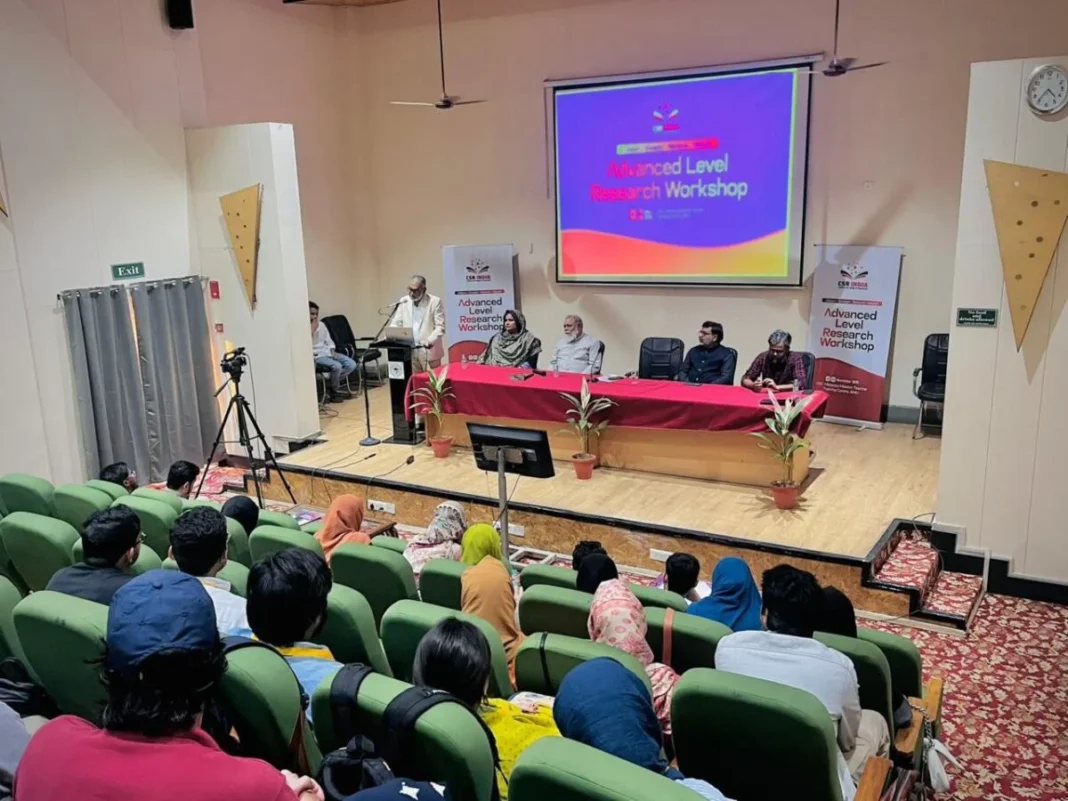Aligarh: At the Centre for Study and Research (CSR), New Delhi workshop, academic scholars and researchers from India and abroad presented Non-Eurocentric research paradigms, urging the world to move beyond conventional intellectual frameworks and stressing the need to critically review the negative narratives propagated by Western researchers.
The CSR Workshop organised an Advanced Level Research Workshop, titled “Unlearn–Envision–Reframe–Rebuild”, at the UGC Human Resource Development Centre (HRDC), Aligarh Muslim University (AMU) in Aligarh. This two-day intellectual event brought together 60 students and research scholars from leading institutions including AMU, Delhi University, Jamia Millia Islamia, Maulana Azad National Urdu University, and Darul Huda Islamic University (Kerala). The workshop witnessed dynamic participation, energetic Q&A sessions, and rigorous scholarly debates.
The New Research Mandate: Non-Eurocentric Paradigms
According to CSR Director Dr. Mohammed Rizwan, the workshop aimed to expose researchers to new interpretations of knowledge, emerging directions in research, and evolving academic requirements.
In his inaugural address, Adjunct Professor and CSR Director Dr. Rizwan shed light on the vision and mission of the CSR for comprehensive, effective, and alternative research. He also discussed the objectives of the CSR, the new angles of knowledge and research, and mentioned the research journey of the CSR in this regard. He stated, “Even a small addition, a particle, to knowledge is considered a great achievement.”
Knowledge as a Moral Force : Dr. Irfanullah Farooqui
Dr. Irfanullah Farooqui (Assistant Professor, IIM Kozhikode) delivered a compelling session on “Unpacking Knowledge: Navigating Complexity and Evolution,” urging young scholars to embrace responsibility and sharpen their analytical skills.
Emphasising the transformative power of knowledge, he said, “When a person becomes knowledgeable, responsibility falls on their shoulders; it is as if knowledge makes a person sensitive.”
To demonstrate the moral dimension of knowledge, Dr. Farooqui cited the historic incident of Prophet Muhammad (PBUH) in Ta’if. When the people behaved harshly, he said, the Prophet neither condemned their actions nor retaliated; instead, he explained, “The Messenger of Allah did not take offense at that behavior but said these people are not knowledgeable; if they had knowledge, they would never adopt such behavior.”
Shifting to methodological skills, Dr. Farooqui emphasised the importance of Critical Thinking, “Students and young researchers must develop creative, analytical, and critical thinking because these are essential capacities to effectively analyze and diagnose any issue or narrative.”
Challenging Western Misreadings of Islam : Dr. Tauseef Ahmad Parray
Dr. Tauseef Ahmad Parray (Assistant Professor, Higher Education, J&K) examined prevalent Western narratives about Islam. He highlighted that Islamic history and the Prophet’s biography (Seerah) are often presented in distorted and ambiguous ways by Western scholars and orientalists.
He asserted, “It is very necessary to critically review the negative narratives of Western researchers.”
His session offered a thorough critique of several Western intellectual works on Islamic history.
Civilizational Knowledge Through Monotheism (Tawhid) : Prof. Berghout Abdelaziz
From the International Islamic University Malaysia, Prof. Berghout Abdelaziz presented a deep civilizational perspective in his talk on “Re-envisioning the Civilizational Tawhidic Paradigm of Knowledge and Research.”
He explained, “In the principles of knowledge, Tawhid (unity) is an essential element, and through it, an individual can recognize Allah, who is Al-Haqq (Truth/The Reality).”
Re-Imagining Research Paradigms : Prof. Muhammad Mumtaz Ali
World-renowned scholar and writer Prof. Muhammad Mumtaz Ali (International Islamic University Malaysia) delivered a thought-provoking lecture titled “From Thought to Thesis: (Re)Imagining the Alternative Paradigm.” He emphasised the urgent need to restructure research paradigms within an Islamic worldview.
Publication Challenges and Scholarly Dissemination : Dr. Rizwan
In his technical session “Dissemination of Knowledge: The Saga of Publication Praxis,” Dr. Rizwan discussed, challenges in academic publishing, evolving practices in research dissemination, and journal standards and submission protocols. He explained how and where research should be published in today’s competitive academic landscape.
Re-Sacralization of Knowledge : Prof. Yusuf Amin
The final session featured an in-depth dialogue between Dr. Rizwan and Prof. Kanwar Muhammad Yusuf Amin (former CSR Chairman) on “Re-Sacralization of Knowledge: The ‘impasse’ of methodology.”
Prof. Amin emphasised the integrative nature of Islamic epistemology, “There is no duality in knowledge, nor has Islam presented knowledge in separate compartments; rather, knowledge is a single unit.”
Discussing classical philosophy, he advised, “We should not run away from traditional philosophy.”
Islamic Economics in Social Sciences : Dr. Waseem Naser
Dr. Waseem Naser (Post-Doctoral Fellow, CSR) introduced an innovative perspective on the foundation of economics in social sciences, examining Adam Smith’s theory alongside Islamic economic principles.
AI in Academia, A Tool, Not a Substitute : Dr. Irfan Waheed
Noted translator and Assistant Secretary of Tasneefi Academy, Dr. Irfan Waheed, conducted an essential session on the effective and responsible use of Artificial Intelligence (AI) in research.
Demonstrating practical applications, he said, “Artificial Intelligence helps researchers and scholars in a very short time so they can advance their research journey in a more effective, excellent, and organized way.”
Rebuilding Research Methodologies : Prof. Parvez Alam
Prof. Parvez Alam (Political Science, AMU) spoke on “Methodological Viewpoints in Social Sciences: Unlearning to Rebuild Knowledge.” He urged researchers to abandon restrictive traditional methods and adopt innovative approaches to knowledge production.
The workshop ended with the concluding address by JIH Vice Presdient and CSR Chairman S. Ameenul Hasan. The presence of Prof. Faiza Abbasi , Director of HRDC, AMU and Prof. Naseem Ahmad Khan Director, CEPECAMI, AMU highlighted the institutional support for this critical scholarly initiative.

